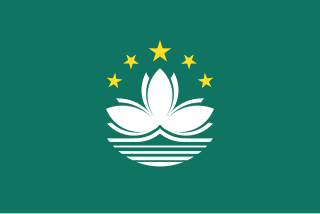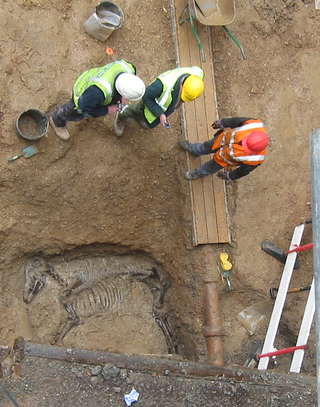
Macau or Macao, officially the Macao Special Administrative Region of the People's Republic of China (MSAR), is a city and special administrative region of China in the western Pearl River Delta by the South China Sea. With a population of about 680,000 and an area of 32.9 km2 (12.7 sq mi), it is the most densely populated region in the world.
In the broadest sense, cultural resource management (CRM) is the vocation and practice of managing heritage assets, and other cultural resources such as contemporary art. It incorporates Cultural Heritage Management which is concerned with traditional and historic culture. It also delves into the material culture of archaeology. Cultural resource management encompasses current culture, including progressive and innovative culture, such as urban culture, rather than simply preserving and presenting traditional forms of culture.

The Macanese people are an East Asian ethnic group that originated in Macau in the 16th century, consisting of people of predominantly mixed Cantonese and Portuguese as well as Malay, Japanese, English, Sinhalese, and Indian ancestry.

Cultural tourism is a type of tourism activity in which the visitor's essential motivation is to learn, discover, experience and consume the tangible and intangible cultural attractions/products in a tourism destination. These attractions/products relate to a set of distinctive material, intellectual, spiritual, and emotional features of a society that encompasses arts and architecture, historical and cultural heritage, culinary heritage, literature, music, creative industries and the living cultures with their lifestyles, value systems, beliefs and traditions.

Rescue archaeology, sometimes called commercial archaeology, preventive archaeology, salvage archaeology, contract archaeology, developer-funded archaeology or compliance archaeology, is state-sanctioned, archaeological survey and excavation carried out in advance of construction or other land development. Other causes for salvage digs can be looting and illegal construction. One effect of rescue archaeology is that it diverts resources and impacts pre-planned archaeological work.

Chinese Australians are Australians of Chinese ancestry. Chinese Australians are one of the largest groups within the global Chinese diaspora, and are the largest Asian Australian community. Per capita, Australia has more people of Chinese ancestry than any country outside Asia. As a whole, Australian residents identifying themselves as having Chinese ancestry made up 5.5% of Australia's population at the 2021 census.

Archaeotourism or Archaeological tourism is a form of cultural tourism, which aims to promote public interest in archaeology and the conservation of historical sites.

In British law, an ancient monument is an early historical structure or monument worthy of preservation and study due to archaeological or heritage interest. The Ancient Monuments and Archaeological Areas Act 1979 classified ancient monuments as "scheduled monuments" or monuments that are considered by the Secretary of State of archaeological, historical or artistic importance.
Australian archaeology is a large sub-field in the discipline of archaeology. Archaeology in Australia takes four main forms: Aboriginal archaeology, historical archaeology, maritime archaeology and the archaeology of the contemporary past. Bridging these sub-disciplines is the important concept of cultural heritage management, which encompasses Aboriginal and Torres Strait Islander sites, historical sites, and maritime sites.

Cultural heritage management (CHM) is the vocation and practice of managing cultural heritage. It is a branch of cultural resources management (CRM), although it also draws on the practices of cultural conservation, restoration, museology, archaeology, history and architecture. While the term cultural heritage is generally used in Europe, in the USA the term cultural resources is in more general use specifically referring to cultural heritage resources.

The Archaeological Institute of America (AIA) is North America's oldest society and largest organization devoted to the world of archaeology. AIA professionals have carried out archaeological fieldwork around the world and AIA has established research centers and schools in seven countries. As of 2019, the society had more than 6,100 members and more than 100 affiliated local societies in the United States and overseas. AIA members include professional archaeologists and members of the public.
Jeffrey Shaw is a visual artist known for being a leading figure in new media art. In a prolific career of widely exhibited and critically acclaimed work, he has pioneered the creative use of digital media technologies in the fields of expanded cinema, interactive art, virtual, augmented and mixed reality, immersive visualization environments, navigable cinematic systems and interactive narrative. Shaw was co-designer of Algie the inflatable pig, which was photographed above Battersea Power Station for the 1977 Pink Floyd album, Animals.

The School of Hotel and Tourism Management (SHTM) is one of the schools at The Hong Kong Polytechnic University (PolyU). It was established in 1979 as the Department of Institutional Management and Catering Studies, then renamed as Department of Hotel and Tourism Management in 1992. The department was designated a school in October 2001, which became an independent autonomous academic unit within the university structure in July 2004.
Biosis Pty Ltd is an environmental consultancy firm in Australia. The company provides ecological, heritage, environmental planning and GIS services for business, government and community organisations. It works from several offices in south-eastern Australia, with its head office in Melbourne.

Alice Gorman FSA is an Australian archaeologist, heritage consultant, and lecturer, who is best known for pioneering work in the field of space archaeology and her Space Age Archaeology blog. Based at Flinders University, she is an expert in Indigenous stone tool analysis, but better known for her research into the archaeology of orbital debris, terrestrial launch sites, and satellite tracking stations. Gorman teaches modern material culture studies, cultural heritage management, and Australian stone tools. Gorman is also a founding member of the Archaeology, Science and Heritage Council of For All Moonkind, Inc., a nonprofit organisation developing and seeking to implement an international convention to protect human cultural heritage in outer space.
Isabel McBryde AO is an Australian archaeologist and professor emerita at the Australian National University (ANU) and School Fellow, in the School of Social Sciences, Faculty of Arts. McBryde is credited with training "at least three generations of Australian archaeologists" and is affectionately referred to as the "Mother of Australian Archaeology". McBryde had a "holistic" approach to studying the archaeology of Aboriginal Australia, which has been carried on by many of her students. McBryde has also made considerable contributions to the preservation and protection of Australian cultural heritage, particularly Aboriginal cultural heritage.
Johan (Jo) Kamminga is an archaeologist based in Canberra, Australia. He has played a prominent role in the formation of the practice of Australian archaeology and in particular the Academic discipline.
The following is a list of works about the city of Guangzhou, China.
Sharon Sullivan is an Australian archaeologist, advocate of Indigenous Australian rights, and author of five books on heritage management. She is best known for her work in establishing protocols and programs for cultural heritage management in Australia.
Left Coast Press was an independent, scholarly publishing house specializing in social sciences and humanities. Based in Walnut Creek, California, and distributed globally, the company published approximately 500 books between 2005 and 2016 before the company was purchased by Routledge, who rebranded them as Routledge books. The company also published 13 scholarly journals before its journals division was sold in 2012 to Maney Publishing, now part of Taylor & Francis.









